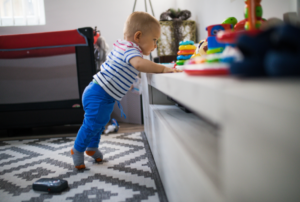Child Development, 9 months
 Watching a child grow and develop is a unique and unforgettable experience. Most children develop skills and abilities in roughly the same order, but the timeframes involved aren’t exact. Milestones are things that a child can do at a certain age. Different organizations may have slightly different ways of describing milestones. Familiarity with milestones can help shape the experiences provided to a child or alert us if there are any concerns.
Watching a child grow and develop is a unique and unforgettable experience. Most children develop skills and abilities in roughly the same order, but the timeframes involved aren’t exact. Milestones are things that a child can do at a certain age. Different organizations may have slightly different ways of describing milestones. Familiarity with milestones can help shape the experiences provided to a child or alert us if there are any concerns.
As children grow, they develop skills they different developmental areas. These include fine and gross motor, language, social-emotional and cognitive areas.
Your Developing Baby: 9 Months
- Possibly pulling up to stand at furniture.
- Crawling (or scooting around on the floor)
- Starts to bang objects together.
- Uses pads of fingertips to grasp a toy.
- Looks for objects when dropped out of sight (like their spoon or toy).
- Looks at pictures in books.
- Turns to look up when their name is called.
- Reacts when you leave (looks, reaches for you, or cries).
- Shows several facial expressions, like happy, sad, angry, and surprised.
- Lifts arms up to be picked up.
- Is shy, clingy, or fearful around strangers.
- Understands words such as ‘bye-bye,’ ’up,’ or ‘no’
- Says sounds like ‘ba-ba,’ ‘na-na,’ ‘ma ma,’ ‘da-da’
- Starting to hold cup to drink.
There are many ways you can help your child’s development.
Play is a learning experience for children. Play is a universal and vital process for the healthy development of every child. Play is the living work of children and allows an opportunity to develop and explore the world.
If you have any concerns about your child’s development, talk to your public health nurse or family doctor.
Services related to this information:
- Contact your Public Health Nurse
- 811 HealthLine (Newfoundland & Labrador) – Call 811 or 1-888-709-2929 / TTY 1-888-709-3555
